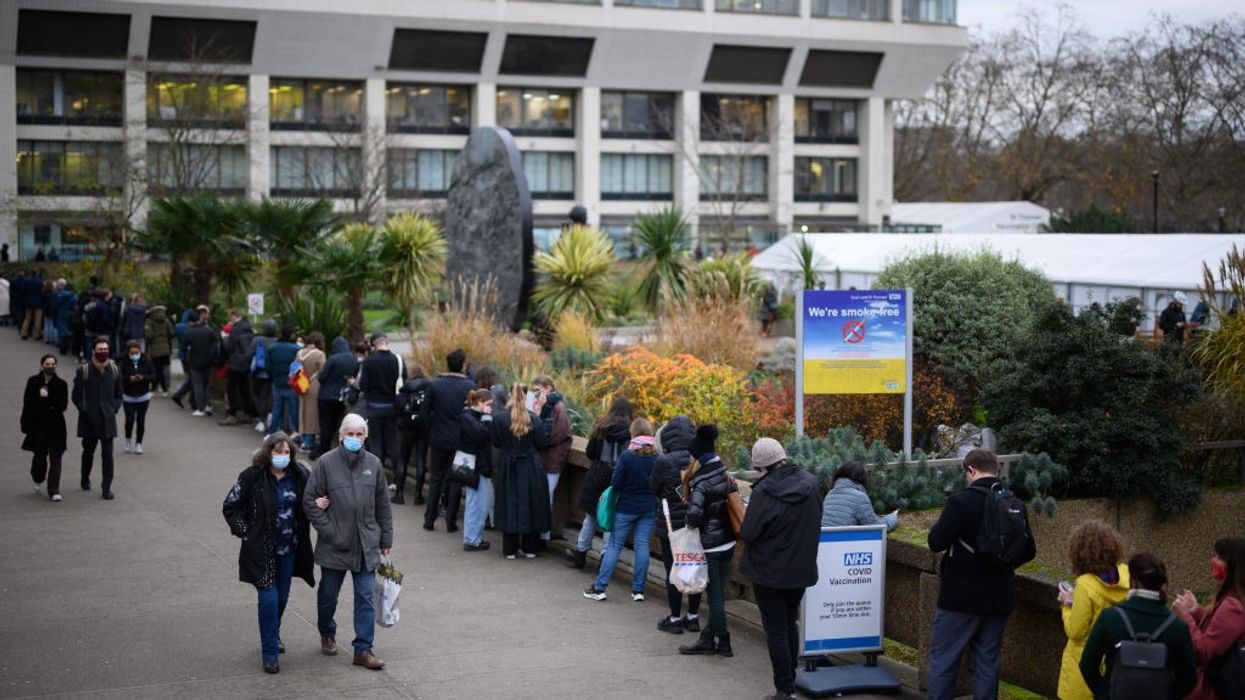AT LEAST one person has died in the UK after contracting the Omicron coronavirus variant, prime minister Boris Johnson said.
The death on Monday (13) is the first publicly confirmed death globally from the swiftly spreading strain.
Since the first Omicron cases were detected on Nov. 27 in Britain, Johnson has imposed tougher restrictions and on Sunday (12) cautioned that the variant could overcome the immune defences of those inoculated with two shots of vaccines.
Britain gave no details on the death other than the person had been diagnosed in hospital. It was not clear if the patient had been vaccinated or had underlying health issues.
"Sadly at least one patient has now been confirmed to have died with Omicron," Johnson told reporters at a vaccination centre in London.
"So I think the idea that this is somehow a milder version of the virus - I think that's something we need to set (to) one side - and just recognise the sheer pace at which it accelerates through the population."
Health secretary Sajid Javid said the variant now accounted for 44 per cent of infections in London and would be the dominant strain in the capital within 48 hours. New Omicron infections are estimated at 200,000 per day, Javid said.
Before the death was announced, Britain said 10 people had been hospitalised with Omicron in various parts of England. Their ages ranged from 18 to 85 years and most had received two vaccination doses.
The UK health security agency said Omicron - first detected in South Africa, Botswana and Hong Kong in late November - can overcome the immunity of those who have had two shots of vaccines such as AstraZeneca or Pfizer-BioNTech .
South Africa's health ministry said it was unable to say with certainty if any of its Covid-19 deaths were caused by Omicron as deaths were not broken down by variant.
The WHO said on Sunday that while preliminary findings from South Africa suggest Omicron may be less severe than the Delta variant - currently dominant worldwide, and all cases reported in the Europe region have been mild or asymptomatic, it remains unclear to what extent Omicron may be inherently less virulent.
'Get booster vaccines'
Johnson, now grappling with a rebellion in his party over measures to curb Omicron and an outcry over staff parties at his Downing Street office during last year's lockdowns, said people should rush to get booster vaccines to protect "our freedoms and our way of life".
After Covid-19 was first detected in China in late 2019, he faced criticism for initially resisting lockdown.
He has also been criticised for overseeing mistakes in transferring patients into care homes, and for building a costly test-and-trace system that failed to stop a deadly second wave.
More than 146,000 people have died from Covid-19 in the UK.
Asked if he could rule out tougher restrictions in England before Christmas, Johnson avoided giving a direct answer. Health minister Javid said he knew of no plans for additional measures. "There are no plans that I am aware of for any further restrictions," Javid said.
Johnson faces growing anger from libertarians in his party over tougher curbs on daily life and sinking poll ratings.
He has also faced criticism over his handling of a sleaze scandal, the awarding of lucrative Covid contracts, the refurbishment of his Downing Street flat, and a claim that he intervened to ensure pets were evacuated from Kabul during the chaotic Western withdrawal from Afghanistan in August.
"The Covid vaccine booking service is currently facing extremely high demand so is operating a queuing system," the NHS said on Twitter. It suggested trying again later.
Home testing kits were also unavailable to order.
NHS in crisis mode
Meanwhile, the NHS was put on a crisis footing as hospitals in England were told to discharge as many patients as possible while estimated daily Omicron cases hit 200,000, The Guardian reported.
Boris Johnson is braced for his biggest rebellion as prime minister on Tuesday (14), with about 80 Tory MPs confirmed to be preparing to vote against his proposed measures.
In a letter to hospitals, NHS England chiefs said patients who could be discharged to care homes, hospices, their own homes or hotels before Christmas to free up beds, should be.
The letter from NHS England’s chief executive, Amanda Pritchard, and medical director Prof Stephen Powis said the service was facing a level 4 “national incident”.
Hotels are already being turned into temporary care facilities staffed with workers flown in from Spain and Greece to relieve rising pressure on NHS hospital beds, the report added.
Hospitals and GPs have also been told to scale back normal services and limit care to those needing urgent attention so that NHS staff can be freed up to deliver boosters.
They have also been told to take ambulance-borne patients into A&E more quickly so that paramedics can get back on the road to answer more 999 calls, speed up efforts to bring in nurses from overseas to help tackle the NHS’s lack of staff, and send as many patients as possible for surgery at private hospitals.
A campaign to give boosters to more than one million people a day got under way, prompting the NHS website to crash and people to queue in the street for up to five hours for their jabs.
But the British Medical Association said the vaccination campaign would not be enough to stop the spread of Omicron, with one in four still not eligible for a booster.
According to the report, No 10 insisted that the booster campaign was its immediate priority, with a senior government source describing the main strategy as “keep on jabbing”.
Labour backed the government’s booster campaign and stopped short of calling for any new restrictions, with Keir Starmer saying it was Labour’s “patriotic duty” to vote for plan B.





